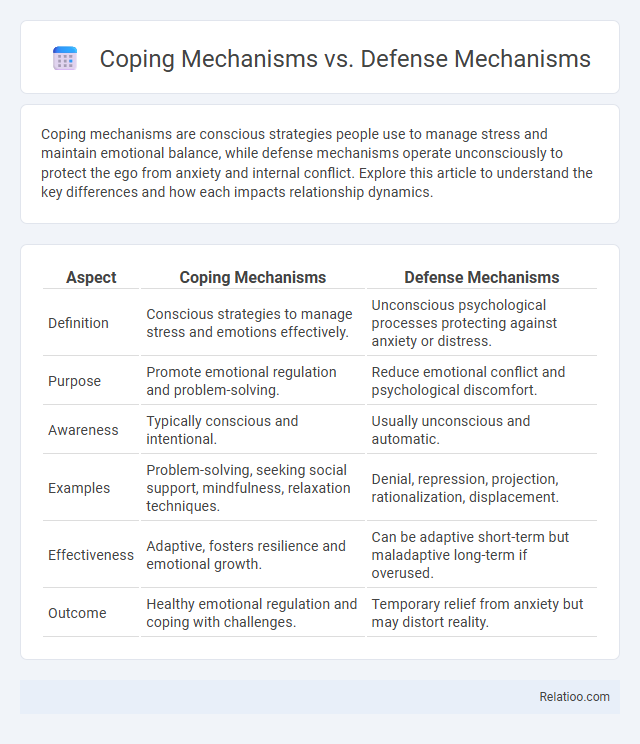Coping mechanisms are conscious strategies people use to manage stress and maintain emotional balance, while defense mechanisms operate unconsciously to protect the ego from anxiety and internal conflict. Explore this article to understand the key differences and how each impacts relationship dynamics.
Table of Comparison
| Aspect | Coping Mechanisms | Defense Mechanisms |
|---|---|---|
| Definition | Conscious strategies to manage stress and emotions effectively. | Unconscious psychological processes protecting against anxiety or distress. |
| Purpose | Promote emotional regulation and problem-solving. | Reduce emotional conflict and psychological discomfort. |
| Awareness | Typically conscious and intentional. | Usually unconscious and automatic. |
| Examples | Problem-solving, seeking social support, mindfulness, relaxation techniques. | Denial, repression, projection, rationalization, displacement. |
| Effectiveness | Adaptive, fosters resilience and emotional growth. | Can be adaptive short-term but maladaptive long-term if overused. |
| Outcome | Healthy emotional regulation and coping with challenges. | Temporary relief from anxiety but may distort reality. |
Understanding Coping Mechanisms: Definition and Examples
Coping mechanisms refer to the conscious strategies and behaviors individuals use to manage stress, emotions, or difficult situations, such as problem-solving, seeking social support, or practicing mindfulness. These mechanisms differ from defense mechanisms, which are unconscious psychological processes like denial or repression that protect the mind from distress. Understanding your coping mechanisms allows you to develop healthier responses to challenges and improve emotional resilience.
What Are Defense Mechanisms? An Overview
Defense mechanisms are unconscious psychological strategies employed to protect the mind from anxiety, stress, or painful emotions. They function by distorting reality or blocking unpleasant feelings to maintain emotional equilibrium. Common defense mechanisms include repression, denial, projection, and rationalization, each serving to reduce internal conflict and psychological discomfort.
Key Differences Between Coping and Defense Mechanisms
Coping mechanisms are conscious strategies that You actively use to manage stress and emotional challenges, whereas defense mechanisms operate unconsciously to protect the psyche from anxiety or uncomfortable feelings. Coping strategies involve problem-solving and emotional regulation, while defense mechanisms often distort reality to reduce psychological distress. Understanding these key differences helps identify whether behaviors are adaptive responses or automatic mental processes related to emotional wounding.
Psychological Functions of Coping Mechanisms
Coping mechanisms serve essential psychological functions by helping individuals manage stress, regulate emotions, and maintain mental equilibrium in challenging situations. Unlike defense mechanisms, which operate unconsciously to protect the ego from psychological harm, coping strategies are often conscious efforts aimed at problem-solving and emotional adjustment. Understanding the distinction between coping mechanisms and psychological wounding highlights how adaptive coping fosters resilience, while unresolved wounds can trigger maladaptive defense responses.
The Role of Defense Mechanisms in Mental Health
Defense mechanisms play a crucial role in maintaining mental health by unconsciously protecting you from anxiety and internal conflicts. Unlike coping mechanisms, which are conscious strategies to manage stress, defense mechanisms function automatically to reduce psychological distress and preserve self-esteem. When defense mechanisms become overly rigid or maladaptive, they can contribute to emotional wounding and hinder personal growth.
Adaptive vs. Maladaptive Responses: Coping and Defense
Coping mechanisms are adaptive strategies your mind employs to manage stress and emotional challenges, promoting resilience and well-being. Defense mechanisms often operate unconsciously to protect you from psychological pain but can become maladaptive if overused, leading to avoidance or denial. Wounding reflects deeper psychological trauma that may disrupt both coping and defense processes, requiring mindful intervention to transform maladaptive responses into healthier, adaptive ones.
Common Types of Coping Mechanisms
Common types of coping mechanisms include problem-solving, seeking social support, and practicing mindfulness, which help you manage stress and emotional challenges effectively. Defense mechanisms, such as denial or repression, unconsciously protect your mind from anxiety but can sometimes hinder emotional growth. Wounding involves psychological injuries from past trauma that may influence your responses, making healthy coping strategies essential for healing and resilience.
Frequently Used Defense Mechanisms Explained
Frequently used defense mechanisms include repression, denial, projection, and rationalization, which help individuals unconsciously protect themselves from anxiety and emotional pain. These mechanisms differ from coping strategies that involve conscious efforts to manage stress, while wounding refers to emotional harm that can trigger defensive behaviors. Understanding how defense mechanisms operate provides insight into automatic responses to internal conflict and traumatic experiences.
Impact on Daily Life: Coping vs. Defense Mechanisms
Coping mechanisms are conscious strategies your mind uses to manage stress and emotions, promoting healthier daily functioning and resilience. Defense mechanisms operate unconsciously, shielding you from psychological pain but sometimes distorting reality, which can hinder effective problem-solving over time. While both impact your emotional wellbeing, relying on adaptive coping skills generally leads to improved mental health and better interpersonal relationships compared to habitual use of defense mechanisms.
Developing Healthy Strategies: Enhancing Coping, Reducing Defense
Developing healthy strategies involves enhancing your coping mechanisms by fostering conscious awareness and adaptive responses to stress, rather than relying on automatic defense mechanisms that may distort reality. Effective coping includes techniques such as mindfulness, problem-solving, and emotional regulation, which promote resilience and psychological growth. Reducing defensive behaviors requires identifying underlying wounds and practicing self-compassion to transform maladaptive patterns into constructive actions that support healing.

Infographic: Coping Mechanisms vs Defense Mechanisms
 relatioo.com
relatioo.com